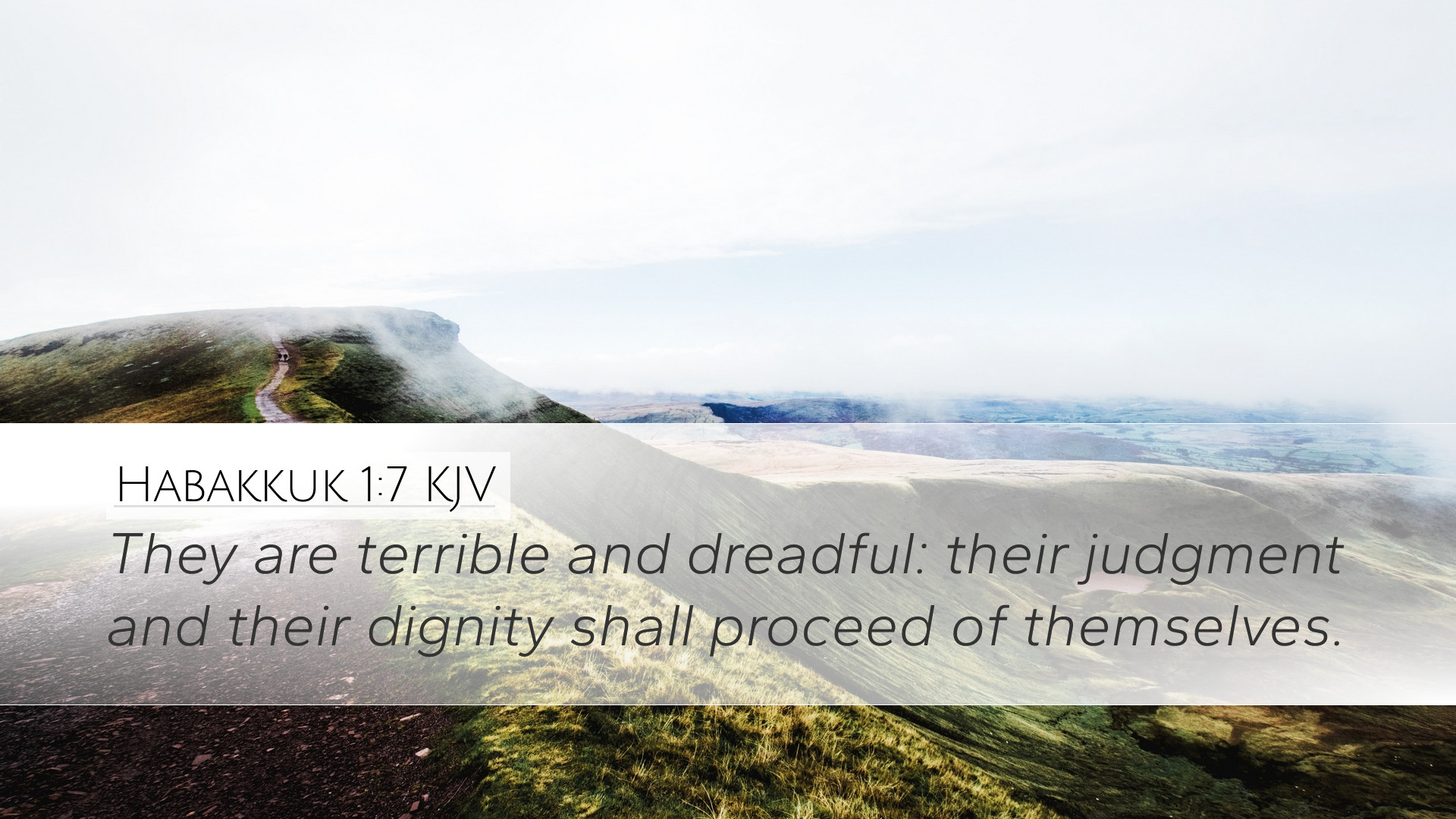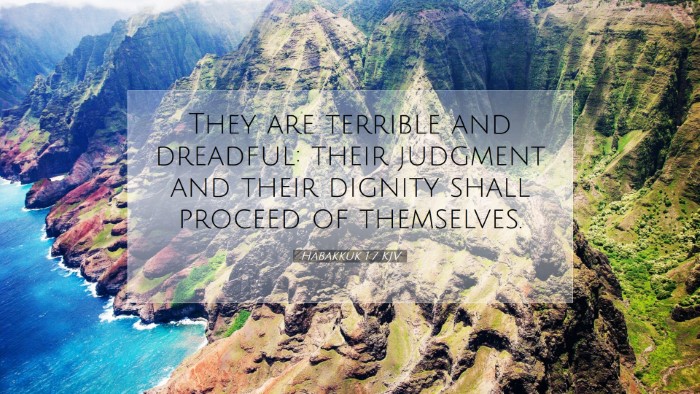Old Testament
Genesis Exodus Leviticus Numbers Deuteronomy Joshua Judges Ruth 1 Samuel 2 Samuel 1 Kings 2 Kings 1 Chronicles 2 Chronicles Ezra Nehemiah Esther Job Psalms Proverbs Ecclesiastes Song of Solomon Isaiah Jeremiah Lamentations Ezekiel Daniel Hosea Joel Amos Obadiah Jonah Micah Nahum Habakkuk Zephaniah Haggai Zechariah MalachiHabakkuk 1:7
Habakkuk 1:7 KJV
They are terrible and dreadful: their judgment and their dignity shall proceed of themselves.
Habakkuk 1:7 Bible Commentary
Commentary on Habakkuk 1:7
Verse: Habakkuk 1:7 (KJV) - "They are terrible and dreadful: their judgment and their dignity shall proceed of themselves."
Introduction
Habakkuk, a minor prophet, presents a profound examination of faith in the face of adversity and injustice. This specific verse, Habakkuk 1:7, speaks to the nature of the Chaldeans, whom God would raise up against Israel. Through combined insights from notable public domain commentaries, we will explore the themes of judgment, pride, and self-assertion inherent in this verse.
Contextual Analysis
Habakkuk's prophetic message unfolds during a time of moral decay and impending catastrophe in Judah. The prophet seeks to understand why God allows such evil to prevail. His dialogue with God reveals layers of complexity regarding divine justice and the human condition.
Understanding the Chaldeans
According to Matthew Henry, the Chaldeans symbolize a fearsome enemy, characterized by their audacity and strength. They are described as "terrible and dreadful," indicating their fierce reputation in warfare and the moral calamity they represent.
Judgment and Dignity
Albert Barnes highlights the significance of "judgment" and "dignity" in relation to the Chaldeans. He suggests that their capacity for judgment and self-justifying dignity stems from their own power and authority rather than from God. This observation raises questions about the nature of true authority and righteousness.
Theological Insights
The Nature of Evil and Providence
The verse implicitly confronts the theological problem of evil and divine providence. Adam Clarke elaborates on the apparent contradiction of a holy God using a sinful nation to punish His people. This tension leads to critical reflections on God's sovereignty and the purpose behind suffering.
The Tools of Judgment
Matthew Henry emphasizes that while the Chaldeans are an instrument of God's judgment, their disposition is not sanctioned by God. God's use of the wicked for His purposes does not imply approval of their actions. It serves to remind believers of the complexity of God's plans and the necessity of maintaining faith amid trials.
Application for Contemporary Readers
The insights gleaned from this verse are both challenging and encouraging for modern readers of the Scripture. In a world filled with injustice and suffering, Habakkuk 1:7 invites reflection on how God operates through human history and the types of judgments He allows.
Pride and Self-Righteousness
Reflecting on the phrase "their dignity shall proceed of themselves," Albert Barnes warns against self-righteousness and arrogance. The Chaldeans, despite their power, are ultimately misguided. This serves as an admonition against pride within the church and individual believers, encouraging humility and reliance on God's righteousness.
Hope Amidst Judgment
Moreover, the prophet's dialogue reveals that amid judgment and suffering, there remains a foundation of hope. As noted by Adam Clarke, the communication between Habakkuk and God illustrates that God listens to the cries of His people. This dynamic fosters theological reflection on God's ongoing engagement with humanity, emphasizing that anguish can lead to greater revelation and understanding.
Conclusion
Habakkuk 1:7 serves as a profound reminder of the interplay between divine sovereignty and human action. Through the insights of Matthew Henry, Albert Barnes, and Adam Clarke, we are encouraged to contemplate not only the nature of God’s judgment but also our responses to it. In a world that often reflects the chaos of the Chaldeans, may we find peace in the knowledge that God’s purposes, often mysterious, are ultimately aimed at redemption and justice.


